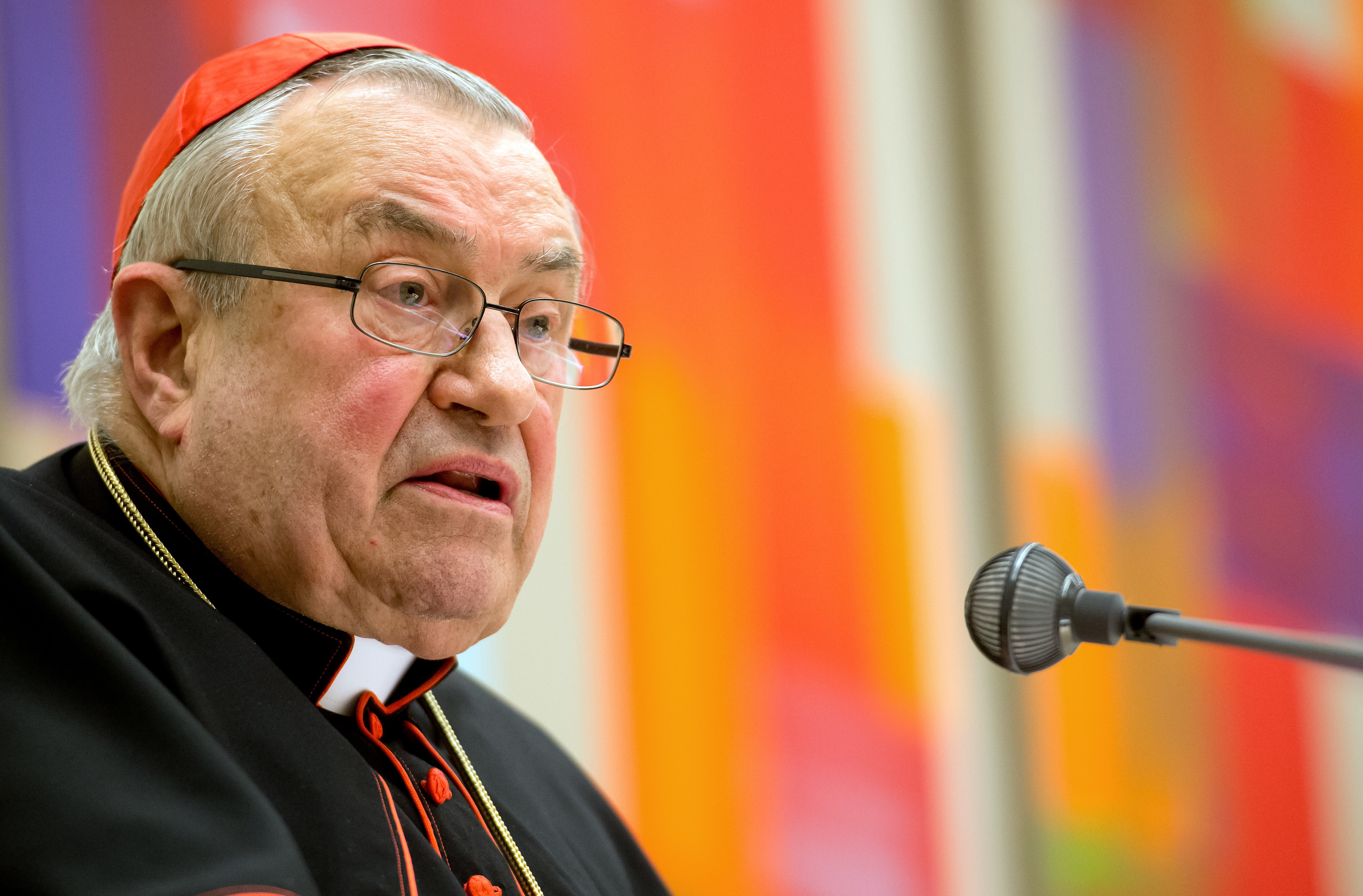
Cardinal Karl Lehmann, longtime president of the German bishops' conference and a respected theologian who participated in the Second Vatican Council, died March 11 at age of 81. He is pictured in a 2014 photo. (CNS/Sven Hoppe, EPA)
Cardinal Karl Lehmann, longtime president of the German bishops' conference and a respected theologian who participated in the Second Vatican Council, died March 11.
The 81-year-old cardinal died at his home in Mainz after declining health and a stroke in September.
In a telegram to Bishop Peter Kohlgraf of Mainz, Pope Francis expressed his condolences and recognized how the late cardinal's service "shaped the life of the church and society."
"He always cared about being open to the questions and challenges of the day and about offering responses and guidance based on Christ's message in order to accompany people along their journey, seeking that which unites beyond the confines of religious denominations, beliefs and nations," the pope said in the telegram.
Cardinal Reinhard Marx, current president of the German bishops' conference, said: "With great shock and grief I received the news of the death of our treasured community brother and friend. ... With his death we lose a warm-hearted and humane bishop, distinguished by his great power of speaking."
"I well remember our first encounters, which were distinctive for warmth and frankness, and above all for enthusiasm for theological debate," said Marx.
"Cardinal Lehmann experienced highs and lows in the bishops' conference," said Marx. "For him, it was always about the question of how a humanely serving and tradition-bound church should be simultaneously achieved."
Lehmann's death was marked by an outpouring of tributes from all major German media, including Der Spiegel, Frankfurter Allgemeine Zeitung, Die Welt, Deutsche Welle, and German radio stations. Although memorials were diverse, all noted the cardinal for his strong opinions, intellectualism and boisterous personality.
Expressing her sadness upon hearing of Lehmann's death, German Chancellor Angela Merkel said in a statement that she was "deeply grateful" for the conversations and meetings she had with him over the years.
She called him "an exceptionally gifted mediator," not only in talks between German Catholics and the Vatican, but "also in the spirit of the economic movement between the Christian churches and between Christians and believers of other religions," according to Vatican News.
Lehmann led the German bishops' conference for 21 years, resigning in 2008 because of health issues. However, he continued to lead the Diocese of Mainz -- where he was appointed in 1983 -- until 2016, when he turned 80.
The cardinal, who participated in the Second Vatican Council, worked to improve the position of women and laypeople in the church.
Although as president of the German bishops' conference, Lehmann often mediated between the church and the Vatican, his hardest task was to build bridges after the years-long debate on the issue of pregnancy counseling. Lehmann and some other bishops believed the church should continue to offer counseling within the state system, under which women are given a certificate that entitles them to a legal abortion. However, in the end, he convinced his mostly skeptical colleagues to go along with the Vatican instruction to withdraw from the system.
He also was one of three German bishops who in 1994 allowed Communion to be given to Catholics who were divorced and remarried without their first marriages being annulled, until the Vatican stopped the practice. After months of dialogue with the three bishops, the Vatican's Congregation for the Doctrine of the Faith issued a letter to the world's bishops restating that Catholics in that situation could not receive Communion.
Advertisement
Lehmann was born May 16, 1936, in Sigmaringen, Germany, and became a priest in Rome in 1963. There he attended sessions of the Second Vatican Council. Before being made bishop of Mainz in 1983, he was professor of theology at the city's university.
He was a supporter of dialogue with the main Lutheran church organization in Germany and joined with its leaders in making public statements on social issues.
St. John Paul II made him a cardinal in 2001.
His death leaves the College of Cardinals with 215 members, including 117 cardinals who are under the age of 80 and eligible to vote in a conclave to elect a new pope.



